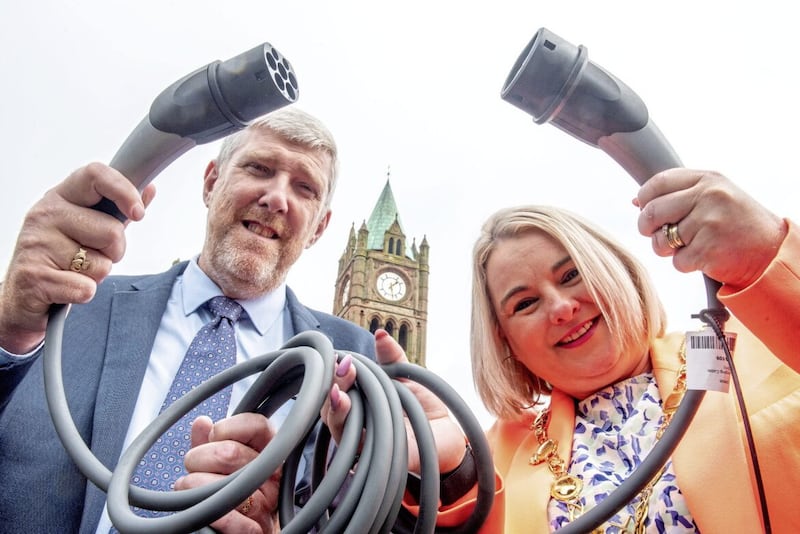THE government might have pledged to ban new petrol and diesel cars from 2030, but there is clearly a lot of work to be done to persuade drivers that electric vehicles are viable alternatives, writes William Scholes.
Price comparison site CompareNI.com surveyed 1,000 consumers - half drawn from Northern Ireland and half from Britain, and including owners of electric and internal combustion cars - about their attitudes towards electric vehicles, or EVs.
Almost two-thirds (62.7 per cent) of the Northern Ireland respondents, who were surveyed last month, said they would go electric 'only when I absolutely have to'. There was little difference in the British end of the survey, with 59.6 per cent similarly reticent.
A quarter said they would change to an EV within five years - a timeframe probably consistent with meaning they want their next car to be electric - and 7.7 per cent said they would make the switch now or 'as soon as feasibly possible'.
A further 4.3 per cent said they would wait until just before the deadline in 2030. The ban due to be introduced then is a significant part of the UK government's push towards a greenhouse gas 'net zero' target by 2050.
Under the plan, new hybrids can be sold until 2035, though to qualify the vehicle will have to be able to travel an as-yet-undefined 'significant' distance on battery power alone.
After that, new cars and vans - with lorries being phased out too - will have to be zero emission, essentially meaning electric- or hydrogen-powered. Pre-2030 petrol and diesel cars can still be used, bought and sold, at least under current proposals.
EVs have many virtues compared to their petrol and diesel counterparts. They are typically quieter, smoother, cheaper to run and maintain, cleaner to 'refuel' and often quicker to drive.
Yet those plus points are yet to persuade a majority of drivers that EVs are inherently desirable.
CompareNI.com's research found that price was the main barrier to getting an electric car (37.8 per cent of Northern Ireland respondents), followed by range anxiety (19.2 per cent) and the lack of charging points, or 'charger anxiety' (18.3 per cent).
Range anxiety should become less of an issue between now and 2030, with better battery technology yielding more efficiency. Yet the industry needs also to better explain how an EV's given range - for example, 200 miles - is probably ample for the vast majority of drivers most of the time.
One would also like to think that our largely dismal public charging network would make some advances - it could hardly get worse - in the coming years, though given the general state of government in Northern Ireland it would be wise not to get too carried away...
Home charging points - which are generally capable of fully charging an EV battery overnight - will only become more common, however. Electricity supplier Power NI is the first to offer a home charger and installation service to customers, going alongside its EV tarrifs; expect others to follow, eventually.

More affordable EVs - or at least those priced competitively compared to internal combustion rivals - will also make a difference. The new MG4 is an example of a persuasive family-sized EV, with 280 miles of range for less then £29k. Kia and Hyundai have strong ranges too.
Price is self-evidently important. We are all more acutely aware of our energy costs than ever before. Heating our homes with gas and oil is rising exponentially, with no clarity on how Northern Ireland households will benefit from the British government's energy cap plans. Electric, too, is only going up and petrol and diesel prices at the pump are both expensive and volatile.
When it comes to running a car, EVs are almost always cheaper, it seems. CompareNI.com found that 37 per cent of those in the north with electric cars said they were saving more than £100 per month compared to their previous fossil fuel vehicle. A further 46.3 per cent said they were saving less than £100 per month. Surprisingly, perhaps, 16.7 per cent of EV owners said they didn’t believe they were making any savings at all.
EV owners' main gripes included a lack of readily available charging points (30.8 per cent), broken charging points (18.5 per cent) and - like the rest of us - rising energy costs (15.4 per cent).
Ian Wilson from CompareNI.com noted there was a significant gap between savings EV owners in Northern Ireland felt they were making compared to those in Britain.
"Electric car drivers here appear to save less, with just 37 per cent saving over £100 per month on their electric car compared to 57.9 per cent in GB - with an increase of 10.6 per cent more drivers in Northern Ireland saying they didn’t save at all," he said.
"There’s also slightly more of a concern over the charging infrastructure itself, with broken charging points ranking higher up the list of worries in Northern Ireland.
"One positive point to bear in mind for those worried about costs, is that electric car insurance is now more readily available as the majority of insurance providers have added electric cars to their offering - making it easier for consumers to shop around and get a competitive premium."
In the year-to-date, according to industry trade body the Society of Motor Manufacturers and Traders, 14 per cent of new cars registered were battery-electric.
CompareNI.com says data from people using its website for insurance and breakdown comparisons shows an increase of just 0.2 per cent in customers with electric or hybrid cars between June 2021 and June 2022. Meanwhile, the average cost of those EVs and electrified cars has increased from £34k to £39k.
The journey to an electric future is unavoidable. Manufacturers, government and others could do more to make the road to 2030 smoother.







